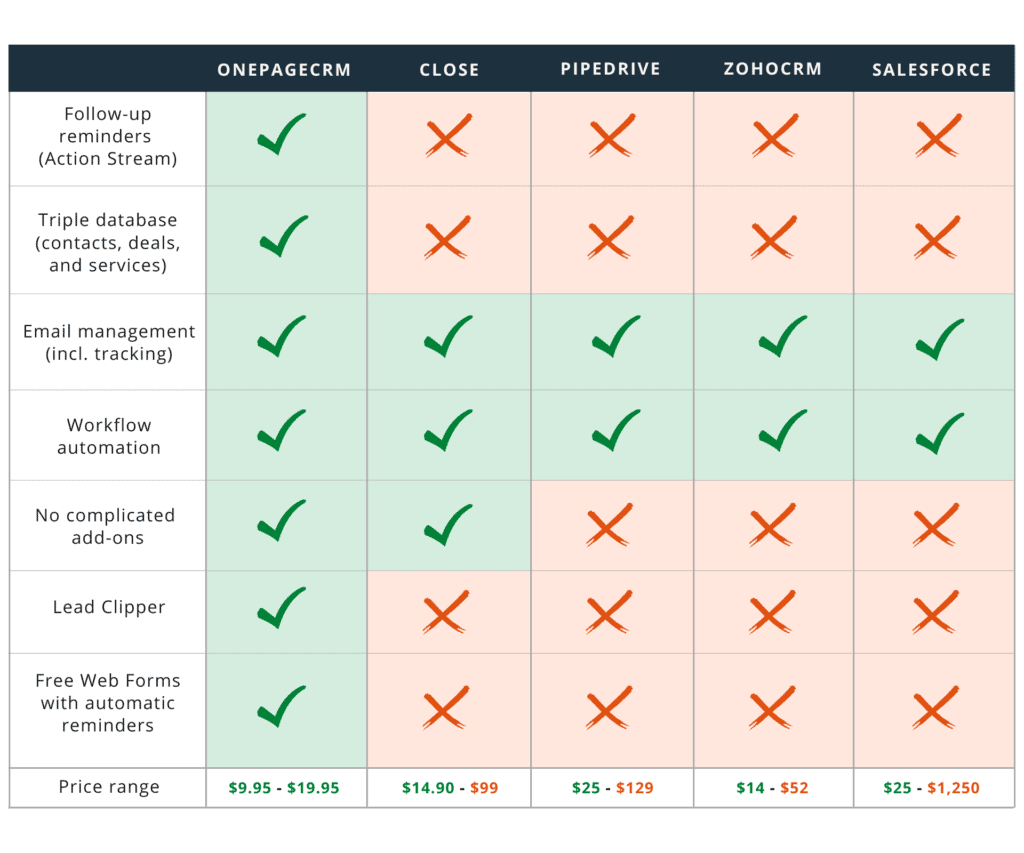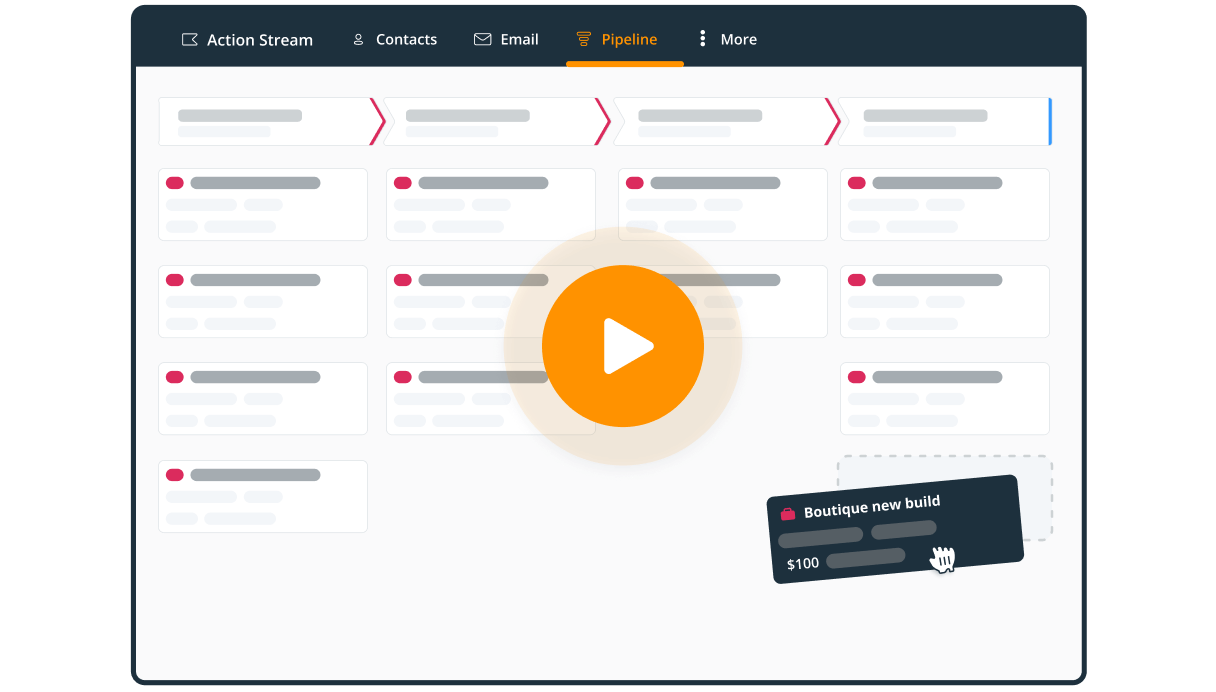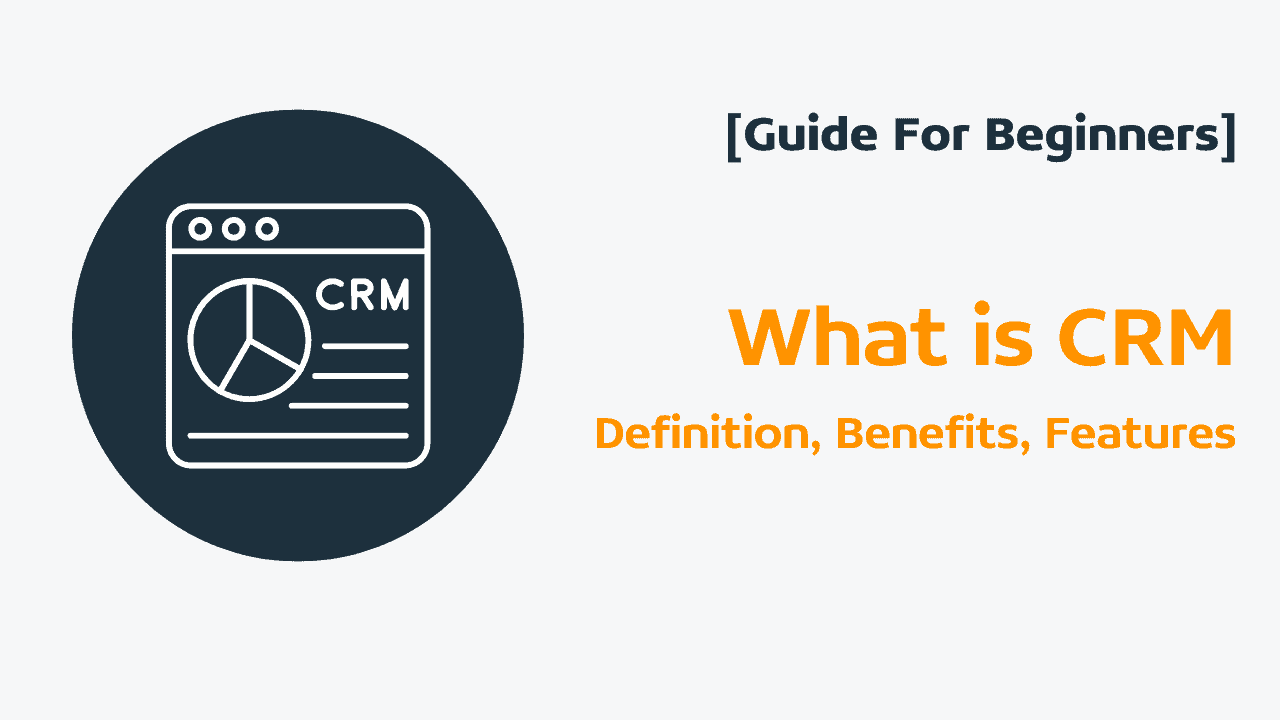
What Is CRM? Definition, Benefits, Features [Guide For Beginners]

There comes a moment when your business outgrows spreadsheets and you start looking for proper tools to manage your operations. This transition from using a spreadsheet as your client database to a dedicated software can be challenging and it comes with several questions:
- What is a CRM system?
- How can it benefit my small business?
- Does it really benefit a small business that has just a few employees?
- Is it efficient to use a CRM if you’re a solopreneur who runs a consulting firm?
- Are there any differences between a CRM system for a small business and for a large enterprise?
This simple guide will answer all of the above questions and will explain what a CRM is and what features it needs to have if you have a small business.
But before we start…
Why read this guide for beginners?
There are thousands of CRM solutions, and this variety leads to more confusion.
First of all, it can be difficult to differentiate between a client database and a CRM system. Besides, creating trials for all popular solutions is not always feasible and time-efficient. There needs to be a better way.
In this guide, we’ll introduce a simple CRM definition and also give a very simple CRM classification that works well for founders, consultants, and salespeople who don’t need a cumbersome tool to manage relationships with clients.
This guide will help you easily navigate between different CRM options without getting overwhelmed or confused.
What is a CRM… and what it is not?
CRMs are used by sales and marketing teams to track interactions with potential and existing clients: from something as simple as email communication to the list of the client’s orders.
The definition of a CRM system sounds very simple on paper but it’s usually a bit confusing in reality.
- Can a simple spreadsheet with contact details be considered a CRM tool?
- Can a phonebook count as a CRM system?
Although both Google Sheets/Excel and phone books are used for storing and organizing contact information, a good CRM system doesn’t stop at data storage and management.
A good CRM should have three main components:
- Data storage and management features. A CRM is a central database for keeping records of all interactions with clients and leads.
- Relationship-building functionality. Contrary to a spreadsheet or a phonebook, a good CRM solution has features that help you build relationships with clients and leads. For example, follow-up reminders or email management.
- A built-in methodology. For example, OnePageCRM is famous for its Next Action principle while HubSpot is known for its Inbound Marketing methodology.
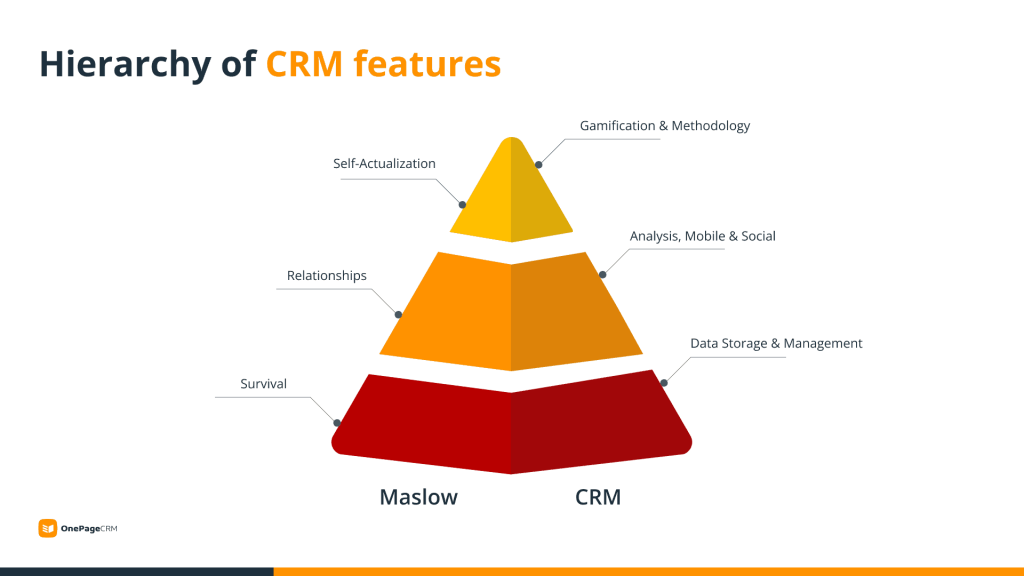
As you can see, storing and organizing contact information is just the very basic functionality of every CRM system. Once you have this information, you want to use it to build relationships with your clients.
A spreadsheet or a notebook won’t help you put this information into action.
This is where a CRM comes into play.
Why do businesses need a CRM?
Recording interactions with clients and keeping your records straight sound easy when you have 5-10 clients. In this case, you can use a simple Google spreadsheet.
However, once your business grows, you start getting more and more clients. Keeping their information organized in a spreadsheet becomes too time-consuming.
For example, if you have hundreds (or thousands) of clients, at some point, you’ll need to segment them to provide them with better support. You will also have multiple points of contact with clients and will need to keep all meeting notes and email communication organized and easily accessible.
Once you feel that your client database is becoming messy and cumbersome, it’s usually a sign you need to look for a CRM solution. And most businesses, both small and large, prefer online CRM systems for their convenience and easy set-up.
Here’s a list of the top three CRM benefits:
Benefit #1: CRM helps you keep all information in one place
While you can keep track of some notes about your clients in non-CRM tools, these notes will be hard to manage.
Imagine the following situation.
Jane Doe has been your client for the last 2 years. It’s quite a long time and you’ve already interacted with her on multiple occasions. Besides her contact details, you’d also want to have:
- A record of your email communication with Jane
- Any call or meeting notes
- Invoices or other documents
- And many other things, depending on your business model.
Remembering all of this for every client doesn’t sound feasible.
A CRM system allows business owners to keep all relevant client information easily accessible in one place instead of being scattered across several apps.
Similar to how you look at LinkedIn profiles, you need to be able to work with client profiles in your CRM and quickly grasp what’s the story behind this contact by looking at their Contact Page.
Benefit #2: CRM can increase your bottom line
CRMs are built for managing and structuring your client information. This, in turn, can increase your bottom line.
When used correctly, a CRM can unlock several benefits for your business:
- A 360-degree view of your clients. This means that you’ll be able to provide them with a more personalized experience. For example, if during a call, your client mentions that they are planning a short trip this weekend, you can leave a note in your CRM and ask them about their trip the next time you’re on a call with them. This small personalization touch can help with client acquisition and retention.
- Smooth processes. Having a CRM helps you streamline processes and speed up routine work. You won’t need to pause to think about what the next best step is — your CRM can record this information after every client interaction and nudge you when it’s time to act. If you have a team, by using a CRM, your team members can assign tasks and notes to each other to make sure that everyone is on the same page and there is no miscommunication.
- Optimization. With the right CRM, management can get insights into the sales team’s performance and forecasted revenue to optimize the sales process.
Case Study
Award-winning London PR agency PHA Media knew from experience that things could quickly get out of hand with their new sales team if a sales process was not put in place.
“Within a few weeks, it was clear that managing and following up all leads in a timely fashion would be impossible without a CRM for sales”
— Charles Howard, Business Development Manager
Charles wanted to keep their sales team focused on the sale so they needed a tool which allowed them to predict revenues and manage follow-ups in a timely manner. Prior to using a CRM, they had no way of knowing who had previously reached out to prospects.
This was also a real pain point for the team as it often led to extra admin work – checking if other colleagues had reached out and when. The created sales process led to an 84% increase in lead traffic for the company.
Benefit #3: Put client information into action
Simply having all important information neatly organized right in front of you won’t make your business grow. Information without taking action is not helpful. That’s why, as a small business, you need an action-focused CRM.
An action-focused CRM lets you take control of the data you have in your system and proactively work on building relationships with clients. For example, scheduling follow-up appointments or triggering automated events based on some changes to data.
The best CRM for any business, regardless of how big or small, has a solid follow-up functionality. Research from The Bridge Group of 355 leading B2B sales teams revealed that “sales development reps who make 12 contact attempts (instead of the average 8) perform 16% better!”. Without a tool to manage those interactions opportunities will be missed.
“Your CRM will deliver a ROI of $8.71 for every dollar spent.” – Nucleus Research.
6 obvious signs you need a CRM
By now, we already know what a CRM system is and why businesses need one.
Here are the six most obvious signs that it’s time for a CRM solution:
- Your files and emails are all over the place. It takes time to find anything quickly.
- You don’t have a workflow for some of the things we should do.
- You often lose my meeting notes or keep them in different apps.
- Your clients have to repeat the same things to different team members.
- You have data gaps in our client profiles: for example, how long they’ve been with you, what type of communication they prefer, and how often they interact with you.
- You often forget to follow up with a client if they ask to get back to them in a few months. My team needs constant reminders, they sometimes forget about some tasks. I can’t switch off the work mode during holidays because I’m always worried if there are any urgent tasks left unfinished.
These are the obvious signs that your business should implement a CRM system.
Think for a moment, can you remember the names of all your customers and prospects?
As a general rule, you need a CRM if you can’t remember the name of every customer and prospect you deal with. It means you are starting to let opportunities slip through the cracks and forgetting to follow up in time.
What are the main CRM classifications?
Since there exist thousands of CRM solutions, there were attempts to introduce classifications.
You might know some of them:
- By industry. You can find a CRM built for a specific industry. For example, a CRM for manufacturing or a CRM for real estate. These industry-specific CRMs have niche integrations and industry-related features.
- By department. The bigger your company is, the more complex its hierarchy gets. For example, a CRM can be useful for marketing, sales, customer support, affiliate managers, and so on. That’s why there exist marketing and sales CRMs and also CRMs for customer service teams. While these solutions are somewhat similar, they focus on different functionality.
- By roles. Business relationships come in different sizes and shapes. You can use a CRM to manage relationships with clients, leads, partners, vendors, sponsors, distributors, suppliers, and so on.
- By company type. There are CRMs for small businesses, startups, non-profits, enterprises, and so on.
- By functionality. CRMs are sometimes divided into three big categories: operational, analytical, and collaborative.
- By business model. There are B2B and B2C CRMs. In B2B CRMs, the focus is on managing accounts rather than single contacts.
Although these CRM classifications were created to make lives easier, they don’t help much with choosing the right CRM solution.
Here are a few reasons why these classifications might not be very helpful in your search:
You’ll also want to have operational, analytical, and collaborative features in your CRM without giving a preference to one or another. Besides, your CRM needs to be ultra-simple and help build human-to-human relationships rather than focusing too much on the B2B or B2C model. After all, behind every sale decision, there’s a person.
In other words, these classifications, however comprehensive, don’t help small businesses choose the best CRM solution.
That’s why a simpler CRM classification emerged.
What type of CRM generates growth?
When looking for the right CRM system for a small business, you can divide all options into two categories:
- Admin-focused CRMs
- Action-focused CRMs
This simple CRM classification can help you narrow down the number of vendors and find the best CRM solution for your business without worrying about which of the many classifications it belongs to and if it is really the right choice for you.
The action-vs-admin comparison eliminates unnecessary questions and helps you focus on one simple question: Does this CRM help me build relationships with clients and generate growth as a small business with limited resources?
Admin- and action-focused CRMs have similar functionality but, as you can guess, their primary focus is on two different things: admin vs. action. Either one can make or break your CRM strategy and how successful your CRM adoption is.
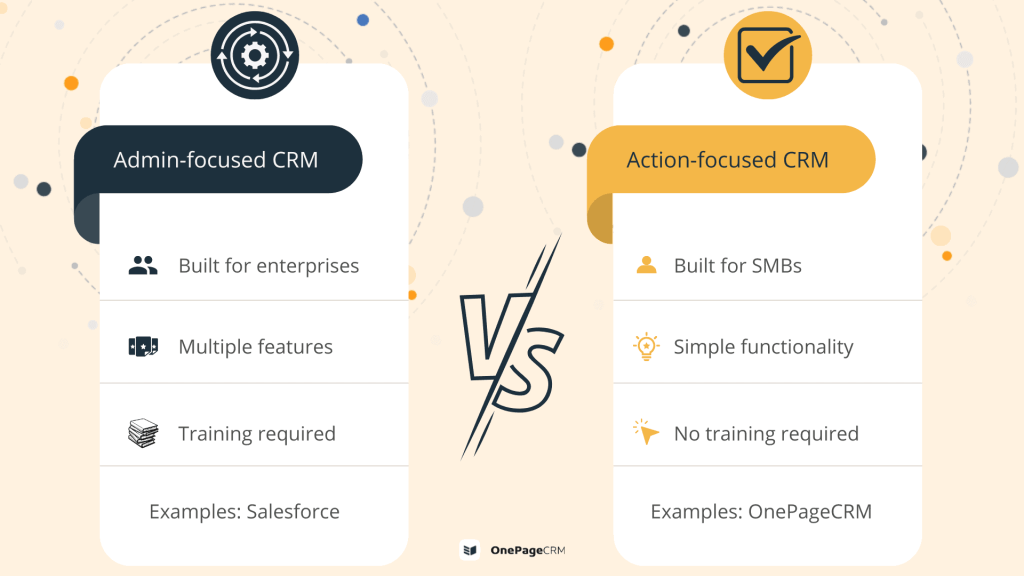
What is an admin-focused CRM?
Traditional, or admin-focused, CRMs are great for managing, organizing, and processing information. They were built for recording and storing the history of client interactions. Based on these records, businesses can then automate client communication and make data-empowered decisions.
Since admin-focused CRMs are mostly built for large enterprises, they need to satisfy lots of different needs. Think about Salesforce. It’s a powerful tool with tons of features and add-ons that are great for multi-departmental customization but can slow down the growth of a small business.
What is an action-focused CRM?
Similar to admin-focused tools, action-focused CRMs allow users to keep all information in one place. But instead of solely storing and managing information, they motivate users to put this information into action. That’s why action-focused CRMs are especially popular with small businesses that need to grow.
Built on productivity principles, action-focused CRMs turn a contact list into a dynamic Action Stream where every client or lead has a reminder/task assigned to them. For example, “Send a follow-up email to John” or “Re-connect with Jane after the NYC conference”.
Video: How an action-focused CRM benefits a small business
For those of you who prefer videos, here’s a short explanation of what an action-focused CRM is, what makes it so simple, and why small businesses prefer it over other solutions.
What is the best CRM for a small business?
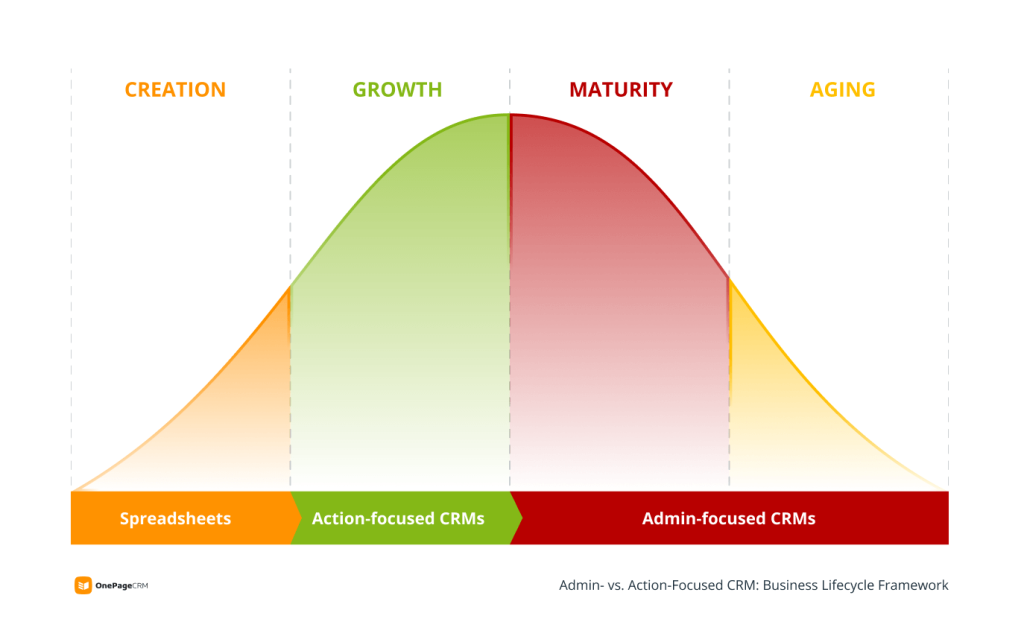
The best CRM for your business depends on your business lifecycle stage.
If you’ve just started a company, you probably don’t have many processes. You might have only a beta version of your product, a few potential users, and a couple of partners. At this stage, a simple spreadsheet can usually suffice.
Once your company starts to grow and get more clients, you’ll need a proper tool to support this growth and build relationships with potential and existing clients. This is the stage where companies start using action-focused CRMs.
Mature companies usually have complex processes, several departments, and a big database of customers. At this stage, you’ll need a highly customizable solution with different add-ons and features. This is when many businesses switch to an admin-focused CRM.
What are the most important CRM features for a small business?
Here’s a short summary of what makes a CRM solution good for a specific business lifecycle stage:
| Spreadsheets/Google Sheets | Action-focused CRMs | Admin-focused CRMs | |
| Used for | Simple data management | Follow-up reminders, lead generation, sales efficiency, workflow automation, email management | Hyper-customization and all-in-one platform (CRM + CMS + ERP) |
| Ease of use | No training required | No training required | Training required (often paid) |
| Focus | Information-centric Contact details and notes | Relationship-centric A full picture of every client profile with seamless integration between your contact, deals, and services databases | Processes-centric A variety of in-depth customization options |
| Price | Free | Starting from $9-10 per month | Starting from $20-50 per month |
Here is a list of must-have CRM features for a small business:
- Proactive follow-ups with reminders organized in an Action Stream. The dynamic list of contacts with time-sensitive reminders and tasks will help you make the most of every contact in your database.
- Triple database. To scale your business and build relationships with clients, you need to have a full client profile easily accessible and in front of you. Ideally, your CRM should let you do this in a simple way and display all vital information on one page without making you switch from one tab to another to piece everything together. In such CRMs, even Dashboards are straightforward, clean, and clutter-free.
- Email management. Emails are an important part of your business communication strategy. While sending them from a separate inbox can be handy at first, after your business grows a bit more, you’d want to keep all business-related communication in one place.
- Workflow automation. As a small business, you don’t need complex automation features but a few triggers can help you speed up your processes and optimize workflow. This can be something as simple as “if a new contact is created, send them an automatic introductory email”.
- No complicated add-ons. If a CRM has different add-ons and a variety of pricing plans, it might be hard to choose which one suits you best. Besides, sometimes by subscribing to a plan, you still have to buy add-ons to unlock some features that might be important for your business. As the result, the cost of your CRM will increase. That’s why ideally you need a CRM without any complicated add-ons.
- Lead Clipper. Lead Clipper is a free browser extension for lead capture. When switched on, it recognizes contact details on any web page, including emails and social media, and lets you easily create new contacts in your CRM in just one click. Lead Clipper is a simple and handy tool for scraping contact information from web pages.
- Free web forms with automatic reminders. While the majority of CRMs offer web forms, ideally you need an online form solution with actionable submissions. For example, with smart Web Forms, once someone fills out your Contact Us page, a new contact will be automatically created in your CRM with a reminder assigned next to them so that you don’t forget to get back to this lead.
As you can see from this list, not every CRM solution ticks all the boxes. For example, the Action Stream is a unique feature and might not be as important for large enterprises as for small businesses. Besides, not every CRM is free of add-ons.
Top 5 simple CRM solutions for a small business
Here’s our list of top CRMs for small business and how they compare in terms of the features listed above:
- OnePageCRM
- Close
- Pipedrive
- Zoho CRM
- Salesforce
